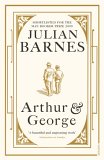Summary | Excerpt | Reading Guide | Reviews | Beyond the Book | Readalikes | Genres & Themes | Author Bio

Critics' Opinion:
Readers' Opinion:
First Published:
Jan 2006, 400 pages
Paperback:
Dec 2006, 512 pages
 Book Reviewed by:
Book Reviewed by:
BookBrowse Review Team
Buy This Book
Arthur
A child wants to see. It always begins like this, and it began like this then. A
child wanted to see.
He was able to walk, and could reach up to a door handle. He did this with
nothing that could be called a purpose, merely the instinctive tourism of
infancy. A door was there to be pushed; he walked in, stopped, looked. There was
nobody to observe him; he turned and walked away, carefully shutting the door
behind him.
What he saw there became his first memory. A small boy, a room, a bed, closed
curtains leaking afternoon light. By the time he came to describe it publicly,
sixty years had passed. How many internal retellings had smoothed and adjusted
the plain words he finally used? Doubtless it still seemed as clear as on the
day itself. The door, the room, the light, the bed, and what was on the bed: a
"white, waxen thing."
A small boy and a corpse: such encounters would not have been so rare in the
Edinburgh of his time. High mortality rates and cramped circumstances made for
early learning. The household was Catholic, and the body that of Arthur's
grandmother, one Katherine Pack. Perhaps the door had been deliberately left
ajar. There might have been a desire to impress upon the child the horror of
death; or, more optimistically, to show him that death was nothing to be feared.
Grandmother's soul had clearly flown up to Heaven, leaving behind only the
sloughed husk of her body. The boy wants to see? Then let the boy see.
An encounter in a curtained room. A small boy and a corpse. A grandchild who, by
the acquisition of memory, had just stopped being a thing, and a grandmother
who, by losing those attributes the child was developing, had returned to that
state. The small boy stared; and over half a century later the adult man was
still staring. Quite what a "thing" amounted to—or, to put it more
exactly, quite what happened when the tremendous change took place, leaving only
a "thing" behind—was to become of central importance to Arthur.
George
George does not have a first memory, and by the time anyone suggests that it
might be normal to have one, it is too late. He has no recollection obviously
preceding all others—not of being picked up, cuddled, laughed at or chastised.
He has an awareness of once having been an only child, and a knowledge that
there is now Horace as well, but no primal sense of being disturbingly presented
with a brother, no expulsion from paradise. Neither a first sight, nor a first
smell: whether of a scented mother or a carbolicy maid-of-all-work.
He is a shy, earnest boy, acute at sensing the expectations of others. At times
he feels he is letting his parents down: a dutiful child should remember being
cared for from the first. Yet his parents never rebuke him for this inadequacy.
And while other children might make good the lack—might forcibly install a
mother's doting face or a father's supporting arm in their memories—George
does not do so. For a start, he lacks imagination. Whether he has never had one,
or whether its growth has been stunted by some parental act, is a question for a
branch of psychological science which has not yet been devised. George is fully
capable of following the inventions of others—the stories of Noah's Ark, David
and Goliath, the Journey of the Magi—but has little such capacity himself.
He does not feel guilty about this, since his parents do not regard it as a
fault in him. When they say that a child in the village has "too much
imagination," it is clearly a term of dispraise. Further up the scale are
"tellers of tall stories" and "fibbers"; by far the worst is the child
who is "a liar through and through"—such are to be avoided at all costs.
George himself is never urged to speak the truth: this would imply that he needs
encouragement. It is simpler than this: he is expected to tell the truth because
at the Vicarage no alternative exists.
Excerpted from Arthur & George by Julian Barnes Copyright © 2006 by Julian Barnes. Excerpted by permission of Knopf, a division of Random House, Inc. All rights reserved. No part of this excerpt may be reproduced or reprinted without permission in writing from the publisher.





The Flower Sisters
by Michelle Collins Anderson
From the new Fannie Flagg of the Ozarks, a richly-woven story of family, forgiveness, and reinvention.

The House on Biscayne Bay
by Chanel Cleeton
As death stalks a gothic mansion in Miami, the lives of two women intertwine as the past and present collide.

The Funeral Cryer by Wenyan Lu
Debut novelist Wenyan Lu brings us this witty yet profound story about one woman's midlife reawakening in contemporary rural China.
Your guide toexceptional books
BookBrowse seeks out and recommends the best in contemporary fiction and nonfiction—books that not only engage and entertain but also deepen our understanding of ourselves and the world around us.